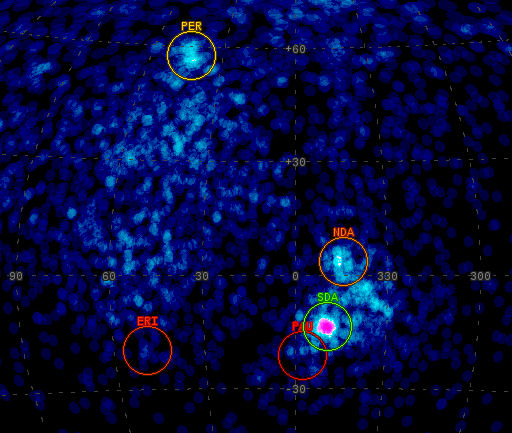www.spaceweather.com
Earth is entering a stream of debris from Comet Swift-Tuttle, source of the annual Perseid meteor shower. Worldwide observers are now reporting more than 30 Perseids per hour, a number that could triple during the weekend when Earth reaches the heart of the debris zone. Forecasters recommend looking during the dark hours before dawn, especially Sunday morning, August 12th, when activity is expected to be highest.
Got clouds? Tune into SpaceWeather Radio for live echoes from Perseid meteors flying over the US Space Surveillance Radar in Texas.
The multi-station Canadian Meteor Orbit Radar, sponsored by NASA's Meteoroid Environment Office, is also monitoring the Perseids. Live data are available here. Bright spots in this sample radar sky map show the radiants of currently active showers:
Clearly, the Perseids are not the only meteors in the sky this weekend. The Northern and Southern Delta Aquarids (NDA and SDA) are also active. These showers, which are minor compared to the Perseids, spring from 96P/Machholz, a comet that some researchers suspect is a visitor from another star system.
This is a great weekend for watching meteors--but that's not all. Venus, Jupiter and the crescent Moon are lining up in the pre-dawn sky right in the middle of the Perseid display. The conjunction of planets guarantees that you will see something beautiful even in the unlikely event that the shower fizzles. Sky maps:Aug. 11, 12, 13.

No comments:
Post a Comment